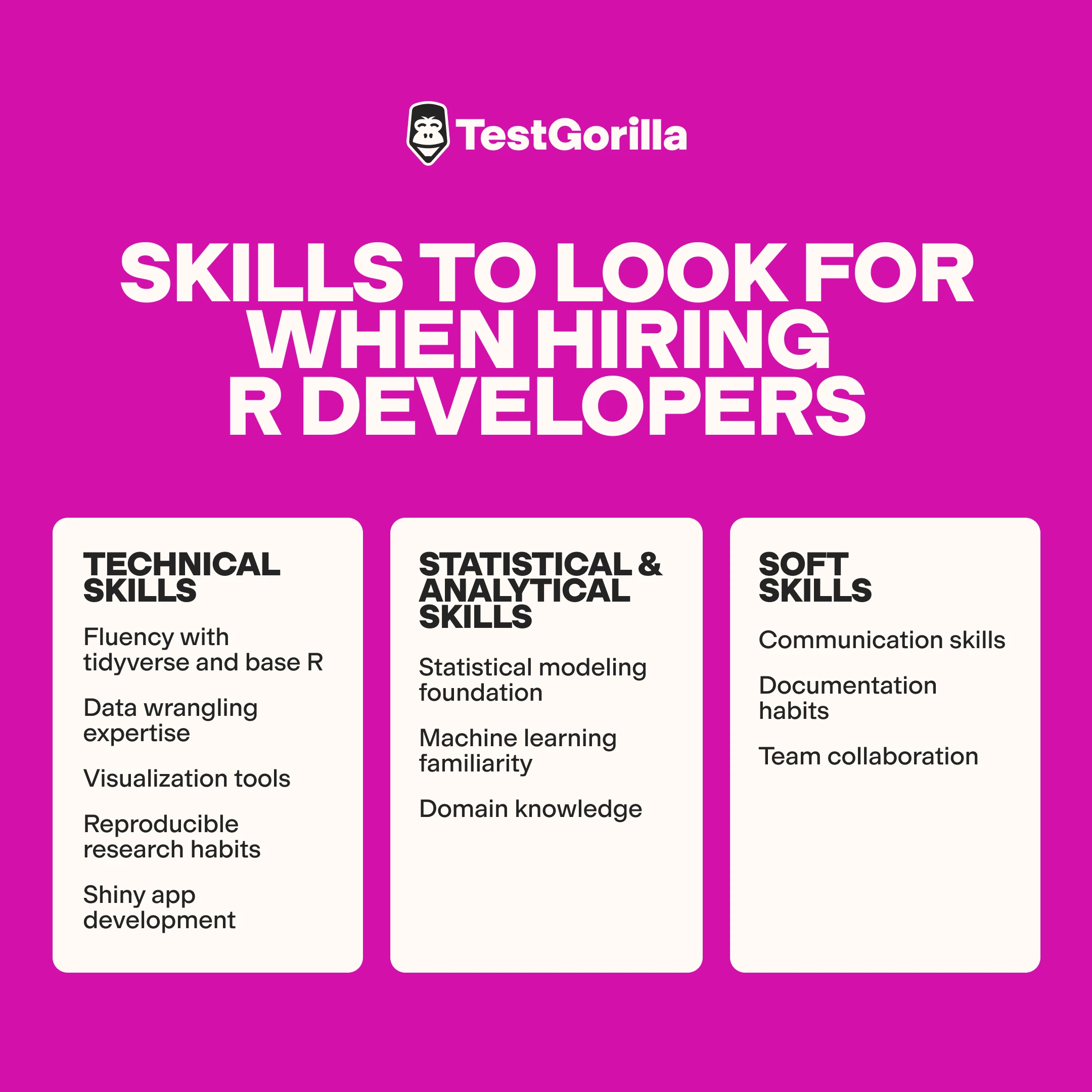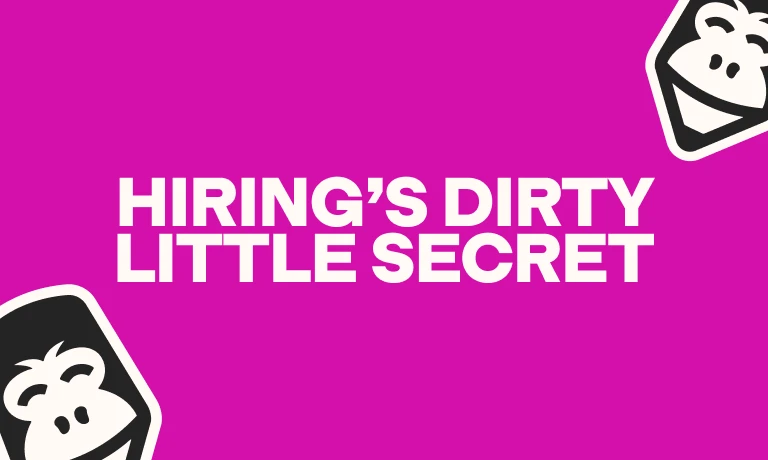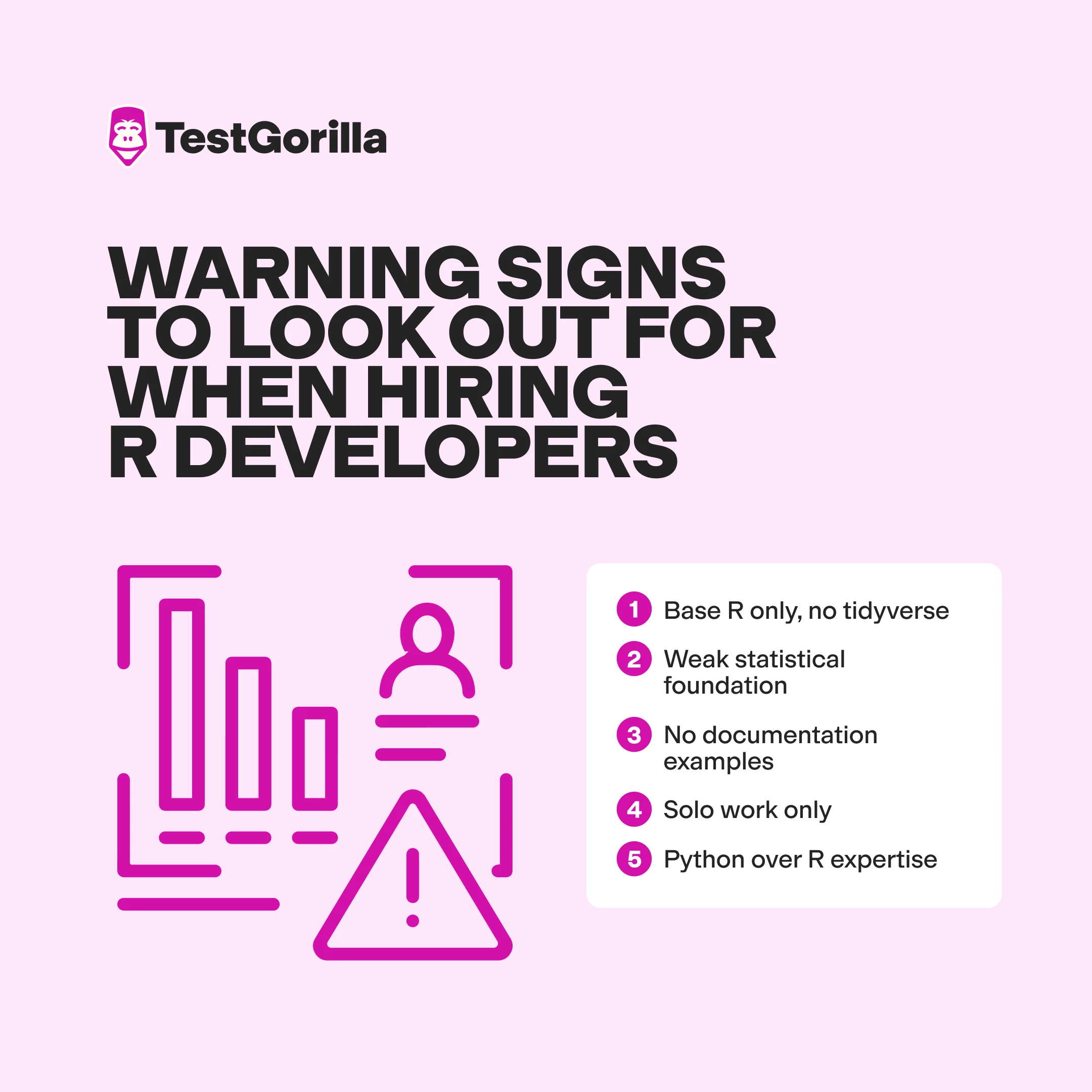Looking for developers who understand data like a native language? R developers are a rare combo of coders who think like statisticians. These professionals can build software that uncovers insights that can change your business. But here's the catch: Hiring them requires its own playbook that differs from the typical software engineer hiring process.
This guide breaks down everything you need. You'll learn what separates the real experts from the wannabes, the R developer tests that work, where to find the devs you need, and how to systematically go about hiring them.
Why hire R developers?
R wasn't built to be just another programming language. It was designed specifically for statistical analysis, data visualization, and modeling, which makes it perfect when accuracy and reproducibility matter most. While Python might be more popular as a swiss-army knife, R is still the statistician's weapon of choice for complex data crunching. That's why experienced R developers are in such high demand.
Many industries use R because of its powerful statistical libraries and specialized packages. You'll see this especially in pharmaceuticals, life sciences, and quantitative finance, where getting the stats wrong can ruin a company.
What do R developers actually do? Here are the big ones:
Advanced statistical models: They build and validate complex models, including regression models, time series analysis, and ANOVA (Analysis of Variance) – a method used to compare the average outcomes of different groups to see if there's a statistically significant difference.
Data cleaning and transformation: Using the tidyverse ecosystem (a popular collection of R packages designed to work together seamlessly), they turn messy, real-world data into a clean, structured format that you can actually analyze.
Reporting: They create automated reports with R Markdown, a tool that combines code, its output (like plots and tables), and written analysis into a single document that can be easily refreshed.
Dashboards: They also build interactive dashboards with Shiny, an R package that creates web apps, allowing non-technical team members to explore data themselves.
Specialized analysis: Whether it's bioinformatics research, epidemiology studies, or financial modeling, they bring the statistical rigor that makes scientific projects stand up to peer review.
Basically, when you hire dedicated R developers, you're bringing deep analytical expertise to your development teams. They make sure your data work is both technically sound and statistically bulletproof.
What to look for in a strong R developer
Finding the right R developer means looking beyond the resume. You want someone who combines technical skills with statistical thinking and can actually explain what they found to humans. The best candidates aren't code monkeys – they're data detectives who can tell a story.
Here's what separates the skilled R developers from the rest. A candidate who brings this mix of technical skills and human skills can handle whatever your science projects throw at them:
Technical skills:
Fluency with tidyverse and base R: Any modern R developer should know their way around the tidyverse suite (dplyr, ggplot2, tidyr) for data manipulation and visualization.
Data wrangling expertise: They should be able to take your messiest dataset and turn it into something clean and analyzable.
Visualization tools: They need to master ggplot2 for a start. Experience with interactive stuff like plotly or leaflet is even better.
Reproducible research habits: Look for candidates who use version control with Git and manage dependencies with renv. They should create reports using R Markdown or Quarto that others can actually follow.
Shiny app development: If you need to deliver insights to non-technical users, experience building interactive web apps with Shiny becomes essential.
Statistical and analytical skills:
Statistical modeling foundation: This is non-negotiable. They need a solid understanding of generalized linear models (GLMs), survival analysis, and hypothesis testing.
Machine learning familiarity: Look for experience with frameworks like tidymodels or caret. This shows they can handle predictive tasks – not just descriptive ones.
Domain knowledge: In fields like healthcare, finance, or academia, understanding the business context is often just as important as coding skills. It helps them ask the right questions and spot bogus results.
Soft skills:
Communication skills: The best R developers can explain complex statistical findings to business people without drowning them in jargon. This skill is surprisingly rare.
Documentation habits: Their code should be clean and well-commented. They should write reports that walk readers through their methodology step-by-step.
Team collaboration: R developers need to work well with other data engineers, business analysts, and research scientists.
The best insights on HR and recruitment, delivered to your inbox.
Biweekly updates. No spam. Unsubscribe any time.
Where to find R developers
The best R developers often come from academic or research backgrounds, so you need to fish where they swim. Here's where to start your search:
Freelance platforms: Sites like Upwork and Toptal have strong pools of freelance R developers. This works great if you have specific project requirements or need specialized expertise for short-term research work.
Academic circles: Since R dominates university statistics and data science programs, consider building relationships with university programs to create a talent pipeline or using academic job boards.
Online communities: Reddit communities like r/Rlanguage and r/datascience are where R users gather to solve problems and share work. Active participation can help you spot knowledgeable, passionate people.
Remote hiring platforms: Sites like Terminal give you access to global talent pools, which helps when you need specialists with rare domain expertise.
Internal referrals: Don't forget your own company. R gets used by analytics teams, business intelligence groups, and research departments. They might know experienced R developers looking for new challenges.
How to assess R developers effectively
The truth is that the job market is competitive, and candidates are prone to overestimating their skills and knowledge in their resumes. Credentials aren’t always good indicators of skill, either: A candidate with a strong portfolio and excellent assessment scores might be better than someone with fancy degrees and job titles but weaker practical skills. Even interviews can fool you if a candidate knows all the right things to say.
You need concrete ways to test whether a candidate can actually do the job.
The best hiring process combines objective assessments with real-world challenges and structured conversations.
Use assessments
Start with skills assessments to screen candidates objectively. This saves time by filtering out people who can't cut it before you invest in interviews. It also reduces bias and focuses on what matters: Can they actually do the work?
TestGorilla's R coding tests let you evaluate candidates on real tasks. Build a complete assessment by combining tests that measure:
Data wrangling and transformation: Use our Data Wrangling test to see if candidates can actually clean and prepare data.
Statistical reasoning: Add our Fundamentals of Statistics and Probability test to check their understanding of core statistical concepts.
Writing clean R code: The many programming tests – from data structures to debugging tests – check their ability to write and troubleshoot functional, reusable scripts.
The best part? You can combine these tests with non-coding tests – including soft skills, software, and language tests – to get a complete understanding of your candidates.
Assign a code review or take-home task
After initial screening, give top-scoring candidates a take-home challenge that mimics real work. This shows you their actual workflow and problem-solving approach.
Here's a practical example:
Give them a messy, real-world dataset and ask for exploratory data analysis, key visualizations, and a summary of findings.
Require the deliverable as an R Markdown or Quarto report. This tests communication skills and commitment to reproducible research.
Have them submit to a Git repository with a renv.lock file. This directly tests their software engineering discipline and ability to create reproducible environments.
Include a communication component here by asking candidates to present their findings from this technical challenge. This tests their ability to translate complex results into clear, useful insights.
Conduct live interviews
The final stage with the highest-skilled candidates is a live conversation. Focus on "why" questions to understand their thinking process.
Good technical questions include:
"Walk me through your approach to the challenge. Why did you choose that specific modeling method?"
"How would you structure a Shiny app for business users to explore this data?"
"Here's the regression output from your model. Can you interpret these results and explain their limitations?"
You should also include non-technical questions to gauge their situational judgment, teamwork abilities, and more. For instance, ask questions like, “Tell me about a time you worked with someone less experienced in R. How did you support them without slowing down the project?”
This will give you a well-rounded view of the candidate, all backed by real data from their test results.
Want more inspiration? For examples of strong, structured interview questions, check out these interview questions for skilled developers.
Red flags to watch for
When hiring for specialized roles like R development, spotting problems early saves you from expensive mistakes. The biggest challenge is separating candidates with deep, practical experience from those with only academic or surface-level knowledge.
Watch out for these warning signs:
Base R only, no tidyverse: The tidyverse is the modern standard for R data analysis. A candidate who doesn't know it probably has outdated skills and will struggle with contemporary workflows.
Weak statistical foundation: A "data scientist" title doesn't guarantee statistical depth. If they can't explain model assumptions or what a p-value means, they might produce unreliable analysis.
No documentation examples: If their portfolio lacks R Markdown reports or examples of sharing results, they might struggle to communicate their work. Analysis that nobody understands has zero business value.
Solo work only: R development in business settings requires teamwork. Candidates who've only done academic solo projects might not be ready for collaborative workflows with code reviews and version control.
Python over R expertise: Skills in other programming languages are nice, but they shouldn't replace deep R expertise for R-specific roles. Make sure their R skills meet your project requirements.
Find your next R developer with skills-based hiring
Hiring R developers is different from hiring other programmers. It requires understanding the unique blend of skills that make them effective, from statistical modeling to writing reproducible, production-ready code to communication.
Resumes often miss practical ability, and unstructured interviews easily overlook gaps in statistical knowledge. We recommend you build a process centered on objective, skills-based evaluation. Combine targeted talent assessments containing coding skills tests with real-world take-home challenges and structured technical interviews, and you can confidently identify R developers with both the technical skills and analytical mindset to excel.
Need to build a stronger, more capable data team? Get a free demo or try TestGorilla for free to learn how TestGorilla can help you hire R developers with the best chance to succeed in our role.
You've scrolled this far
Why not try TestGorilla for free, and see what happens when you put skills first.




















